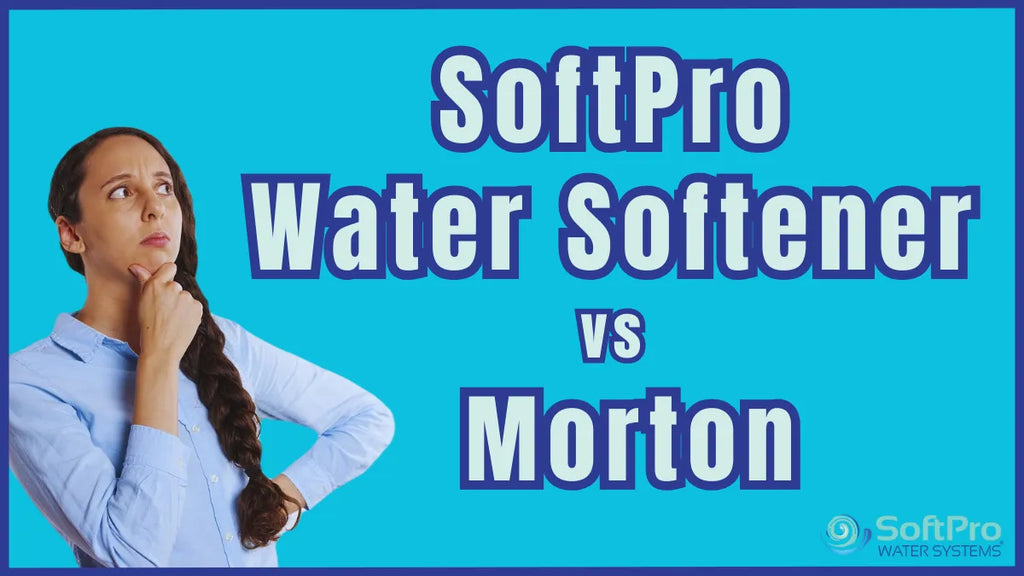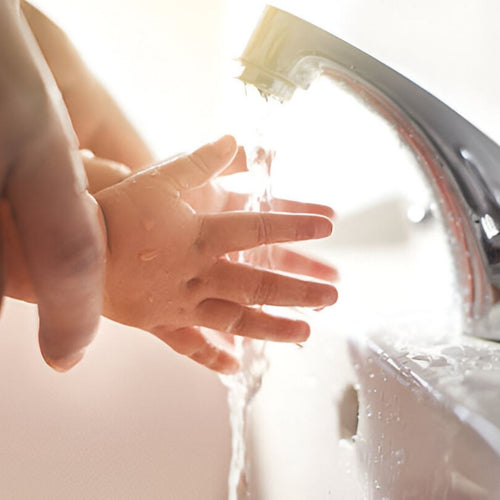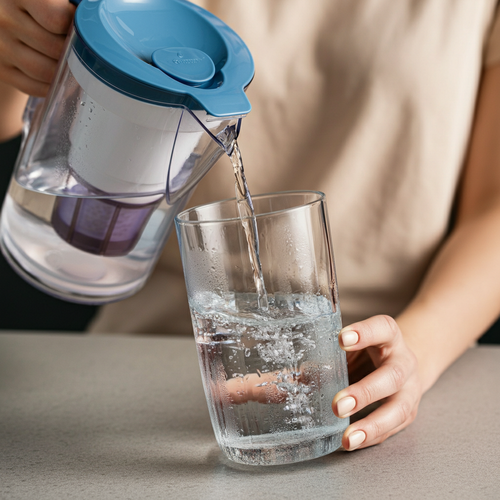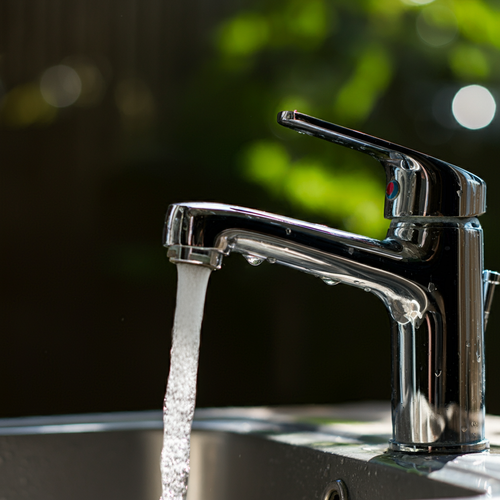Defining Water Softeners and Hard Water
What are Water Softeners?
Water softeners are home appliances designed to remove dissolved minerals, primarily calcium and magnesium, from your water supply. These minerals, collectively known as "hardness minerals," can cause a multitude of problems, including:
- Scale buildup: Hard water leaves behind white, chalky deposits on fixtures, appliances, and dishes, reducing their efficiency and lifespan.
- Soap scum: Soap reacts with hardness minerals, resulting in a slippery film that's difficult to rinse away. This can leave skin feeling filmy and clothes feeling stiff.
- Dry skin and hair: Hard water can strip natural oils from skin and hair, making them feel dry and irritated.
- Reduced water pressure: Over time, scale buildup can clog pipes and decrease water flow.
- Increased water heating costs: Hard water takes longer to heat, leading to higher energy bills.
Water softeners address these issues by replacing the hardness minerals with sodium ions through a process called ion exchange. The softened water is then gentler on your skin and hair, lathers better with soap, and reduces scale buildup, ultimately protecting your appliances and improving your overall water quality.
What is Hard Water?
Hard water is simply water with a high concentration of dissolved minerals, primarily calcium and magnesium. The hardness level is measured in grains per gallon (gpg) or parts per million (ppm). Generally, water above 7 gpg is considered hard, while water above 15 gpg is considered very hard.
The hardness of your water depends on your location and the source of your water supply. Groundwater, for instance, tends to be harder than surface water. You can easily test your water hardness at home using a simple test kit or contacting your local water authority.
Why Soften Your Water?
If you live in an area with hard water, a water softener can significantly improve your water quality and make your life easier in several ways:
- Improved skin and hair health: Softer water is gentler on your skin and hair, preventing dryness and irritation.
- Increased cleaning efficiency: Soap and detergents work better with soft water, requiring less product and leaving fewer residues.
- Longer appliance lifespan: Soft water prevents scale buildup, extending the life of your washing machine, dishwasher, and other water-using appliances.
- Reduced maintenance: With less scale buildup, you'll spend less time cleaning faucets, showerheads, and other fixtures.
- Cost savings: In the long run, water softeners can save you money on cleaning products, appliance repairs, and energy bills.
Now that you have a basic understanding of water softeners and hard water, we can delve deeper into comparing the two main contenders in the market: SoftPro and Morton water softeners.
SoftPro and Morton Water Softeners
Choosing the right water softener for your home can be overwhelming with various brands and models available. Today, we focus on two reputable brands known for their quality and effectiveness: SoftPro and Morton.
SoftPro
- Established brand with a strong reputation for innovation and durability.
- Offers a wide range of water softeners to suit different home sizes and water hardness levels.
- Emphasis on advanced features like self-cleaning technology, Wi-Fi connectivity, and multi-stage filtration systems.
- Tends to have a higher initial purchase price compared to Morton.
Morton
- Widely recognized and trusted brand with a long history in the water treatment industry.
- Offers a more limited selection of water softeners, primarily targeting practical functionality and affordability.
- Focuses on traditional and reliable technology, making them easier to operate and maintain.
- Generally more budget-friendly than SoftPro models.
It's important to note that neither brand is inherently "better" than the other. The ideal choice for you will depend on your specific needs, budget, and desired features.
Performance Comparison: Softening Power and Efficiency
Now that we've introduced SoftPro and Morton water softeners, let's delve into their core performance aspects: softening power and efficiency.
Grain Capacity
- SoftPro: Offers water softeners with a wide range of grain capacities, typically starting from 24,000 grains and scaling up to 60,000 grains or more. This cater to homes of various sizes and water usage levels.
- Morton: Primarily focuses on models with moderate grain capacities, ranging from 16,000 to 32,000 grains. These capacities are suitable for smaller homes or moderate water usage.
Impact on Hard Water
- SoftPro: Generally known for delivering excellent softening performance, tackling even high levels of hardness effectively. This is often due to their use of high-capacity resin beds and efficient ion exchange technology.
- Morton: While reliable, they may not exhibit the same level of aggressive softening as some top-tier SoftPro models, especially when dealing with very hard water. However, they remain effective for moderate hardness levels.
Efficiency
- SoftPro: Some models boast advanced features like variable bypass valves and dual-tank systems, optimizing water and salt usage during regeneration cycles. However, others may have higher regeneration frequency compared to Morton.
- Morton: Known for their focus on practical efficiency. Many models utilize traditional technology and single-tank systems, resulting in less water and salt waste during regeneration, though regeneration cycles might be slightly longer compared to some SoftPro models.
Considerations
- Water hardness level: Choose a softener with sufficient grain capacity for your water hardness and household size.
- Water usage: Opt for a model with an appropriate regeneration frequency to match your water usage patterns.
- Maintenance: Consider models with features like self-cleaning or easy regeneration initiation for added convenience.
Water Quality Improvement: Beyond Hardness Removal
While softening power and efficiency are crucial aspects, understanding how each brand impacts other water quality factors further informs your decision.
Clarity and Taste
- SoftPro: Some models feature additional filtration stages beyond ion exchange, like carbon filters, potentially improving clarity and taste by removing chlorine and other contaminants.
- Morton: Primarily focus on hardness removal, with limited additional filtration options in most models. However, softened water generally tastes better and appears clearer than hard water.
Odor Reduction
- SoftPro: Certain models with advanced filtration systems may address sulfur or other unpleasant odors.
- Morton: Softening itself can help reduce sulfur odor associated with hard water, but additional odor removal features are typically absent.
Mineral Balance
- SoftPro: Softening replaces hardness minerals with sodium, raising sodium levels in treated water. Some models offer bypass settings to maintain some beneficial minerals.
- Morton: Similar to SoftPro, softening increases sodium levels. Users with sodium-restricted diets should consult their doctor or consider alternative treatment options.
Impact on Plumbing
- SoftPro: Some models incorporate corrosion protection features to mitigate potential risks from softened water's slightly acidic nature.
- Morton: Softened water can be slightly acidic, requiring you to be mindful of potential plumbing compatibility, especially with older systems.
Considerations
- Desired level of water clarity and taste: If these are priorities, consider models with additional filtration features.
- Dietary restrictions: Consult your doctor if you have sodium limitations and require specific water treatment options.
- Plumbing compatibility: If you have an older plumbing system, consult a plumber to ensure compatibility with softened water.
Understanding how your chosen water softener affects various aspects of water quality, beyond just hardness removal, allows you to make a more informed choice that aligns with your specific needs and preferences.
Feature Comparison: Convenience and Functionality
Beyond performance, the specific features offered by each brand can significantly impact your user experience. Let's dive into the functionalities and conveniences that set SoftPro and Morton water softeners apart.
Control Panel and User Interface
- SoftPro: Often equipped with digital control panels, touchscreen displays, and even smartphone app connectivity for remote monitoring and programming. This can offer detailed information on water usage, salt levels, and regeneration cycles, along with user-friendly adjustments.
- Morton: Primarily offer traditional push-button or dial controls with basic LED indicators. While straightforward and easy to operate, they may lack advanced functionalities and data accessibility compared to SoftPro.
Additional Features
- SoftPro: Some models boast features like leak detection and prevention systems, self-cleaning mechanisms, and multi-stage filtration for additional contaminants. They may also offer extended warranties and customer service options.
- Morton: Focus on core functionalities, with fewer bells and whistles. However, some models may include bypass valves for temporary hardness bypass or adjustable softener settings for customized performance. They typically offer standard warranties and customer service coverage.
Maintenance and Operation
- SoftPro: Advanced features like self-cleaning and digital alerts can simplify maintenance. However, complex technology may require more user guidance and familiarity compared to Morton.
- Morton: Traditional systems are generally easier to maintain and operate, requiring minimal user intervention beyond salt refilling and occasional regeneration initiation.
Considerations
- Tech-savviness and desired level of control: If you prefer advanced features and customization options, SoftPro's digital interfaces might be appealing. For straightforward operation and minimal learning curve, Morton's traditional controls could be the better fit.
- Budget and value priorities: Decide if additional features offered by SoftPro justify the potentially higher price tag compared to Morton's more basic functionalities.
Remember, the ideal feature set depends on your personal preferences, comfort level with technology, and budget constraints. Weighing these factors will help you choose a water softener that provides the convenience and functionalities you value most.
Cost Comparison: Initial Investment and Ongoing Expenses
Owning a water softener involves both initial purchase costs and ongoing expenses like salt, maintenance, and energy consumption. Comparing these factors for SoftPro and Morton can help you make a financially informed decision.
Initial Purchase Price
- SoftPro: Generally boasts a wider range of models, with higher capacities and advanced features commanding a higher price point. Basic models may start around $700, while top-tier options can reach $2,500 or more.
- Morton: Often falls on the more budget-friendly side, with most models priced between $400 and $1,200. They primarily focus on practical functionalities, keeping costs lower.
Ongoing Expenses
- Salt Usage: Both brands require periodic salt refilling, with the frequency depending on water hardness, softener capacity, and regeneration cycles. Generally, SoftPro models may use slightly more salt due to their advanced features and potentially higher flow rates.
- Maintenance: SoftPro's advanced features might require occasional professional maintenance or service for optimal performance, potentially adding to costs. Morton's simpler systems usually require minimal maintenance beyond DIY salt refilling.
- Energy Consumption: Regeneration cycles consume electricity. Some SoftPro models with optimized technology may exhibit slightly lower energy consumption compared to traditional Morton systems. However, the difference is often negligible in overall power bills.
Considerations
- Budget: If budget is a primary concern, Morton's lower initial price and simpler maintenance might be more appealing. However, if long-term cost savings through features like optimized salt usage are important, SoftPro could be a viable option.
- Water hardness and usage: Higher water hardness and usage levels will generally lead to more frequent regeneration and higher salt consumption regardless of the brand.
- Personal priorities: Weigh your priorities against costs. If advanced features and potential long-term savings matter more, SoftPro might be worth the initial investment. If budget-friendliness and minimal maintenance are key, Morton could be the better choice.
Understanding the various cost factors associated with owning and operating a water softener from each brand enables you to make a financially responsible decision that aligns with your budget and water usage patterns.
User Reviews and Brand Reputation: Insights from Real Users
While technical specifications and cost comparisons offer valuable information, understanding real-world experiences and brand reputation can further solidify your decision. Let's explore what users have to say about SoftPro and Morton water softeners.
Overall Satisfaction
- SoftPro: Reviews often praise the effectiveness of their softening power, particularly in tackling hard water. Users appreciate advanced features like digital control panels, remote monitoring, and self-cleaning functionalities. However, some report occasional technical issues and complexity with certain features.
- Morton: Users generally commend the reliability, affordability, and ease of use of their softeners. The traditional controls and minimal maintenance are viewed favorably by those who prefer straightforward operation. However, some reviews mention concerns about lower softening power compared to high-end SoftPro models, especially in areas with extremely hard water.
Specific Feature Experiences
- SoftPro: Users highlight the convenience of smartphone app connectivity and customizable settings. Self-cleaning features and leak detection are appreciated for added peace of mind. However, some find the digital interface overwhelming and prefer simpler controls.
- Morton: The manual regeneration option and straightforward system operation are commended. Users value the lower price point and minimal maintenance requirements. However, the lack of advanced features like digital displays and remote monitoring may deter tech-savvy users.
Brand Reputation
- SoftPro: Recognized for its innovative technology and high-performance softeners. Customer service is generally well-regarded, with extended warranties offered on some models. However, the higher price point and potential learning curve with advanced features might deter some buyers.
- Morton: Established brand with a long history in the water treatment industry, known for its reliability and affordability. Customer service is perceived as reliable, although the focus is primarily on traditional systems with fewer advanced features.
Considerations
- Align your priorities: Analyze the features and functionalities you value most based on user reviews and match them with the strengths of each brand.
- Read diverse experiences: Look beyond average ratings and seek out reviews that resonate with your water hardness level, usage patterns, and preferred level of tech integration.
- Consider long-term value: Think beyond initial cost and factor in potential savings or benefits offered by advanced features, especially if you plan on long-term ownership.
Remember, user reviews offer valuable insights but should be considered alongside technical specifications, cost comparisons, and your individual needs. Combining all these factors will allow you to make a well-informed decision that aligns with your preferences and budget.
Decision-Making and Conclusion: Choosing the Ideal Water Softener
Now that we've comprehensively compared SoftPro and Morton water softeners across various aspects, it's time to navigate your decision-making and reach a confident conclusion.
Recap of Key Considerations
- Performance: SoftPro generally boasts stronger softening power, particularly for very hard water, while Morton excels in affordability and reliable functionality.
- Features: SoftPro offers advanced features like digital control panels, remote monitoring, and self-cleaning, while Morton focuses on straightforward operation and minimal maintenance.
- Cost: Morton shines with its budget-friendly price point, while SoftPro comes at a premium for its advanced technology and potential long-term cost savings.
- User Reviews: Both brands receive positive reviews, though SoftPro users appreciate technology and customization, while Morton users value simplicity and affordability.
- Brand Reputation: Both are established brands, with SoftPro leading in innovation and Morton in market experience and reliability.
Making the Choice
Ultimately, the ideal water softener for you depends on your specific needs and priorities. Here are some actionable tips to guide your decision:
- Water Hardness: If you have extremely hard water, prioritize softening power and consider high-capacity SoftPro models. For moderate hardness, Morton's reliable yet affordable softeners might be sufficient.
- Budget: Determine your budget and weigh the value proposition of advanced features against initial cost savings. If budget is tight, Morton could be the better fit.
- Tech-Savviness: Consider your comfort level with technology. If you value digital interfaces and remote monitoring, SoftPro might be more appealing. If you prefer simplicity, Morton's traditional controls could be preferable.
- Long-Term Needs: Think about your usage patterns and long-term goals. If you value potential cost savings through features like optimized salt usage, SoftPro might be worth the initial investment. If minimal maintenance and straightforward operation are your priorities, Morton could be the ideal choice.
Remember, there's no single "best" brand. Analyze your needs, compare specifications, consider user experiences, and align your budget with the value proposition offered by each brand. By carefully weighing these factors, you can confidently choose the water softener that will effectively address your hard water problems and bring lasting satisfaction to your home.
You can also read more articles about SoftPro compared to other brands, including SoftPro vs Magnetic Water Technologies and SoftPro vs NorthStar.


















![Aldex Premium 10% Cross Link Resin for Water Softener [High Capacity]-SoftPro® Water Systems](http://www.softprowatersystems.com/cdn/shop/files/Aldex_10_Cross_Link_Resin_Premium_High_Capacity_for_Water_Softener_600x.jpg?v=1735853599)





















